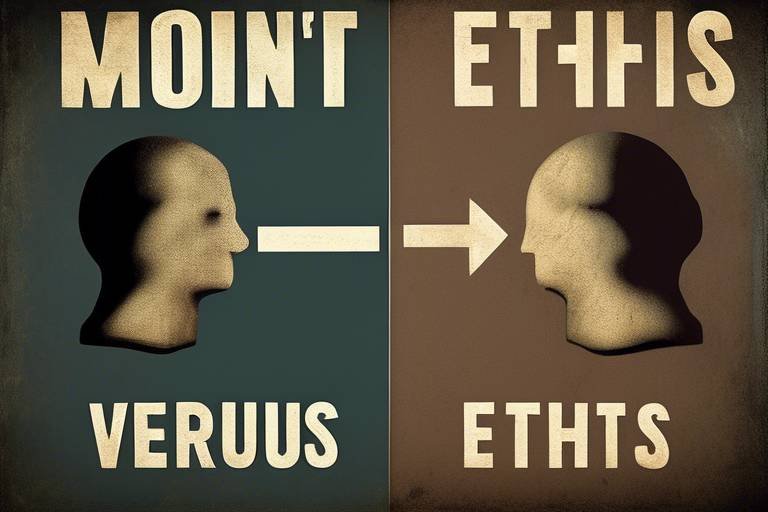Business Ethics - Why They Matter More than Ever
In today's fast-paced corporate world, the significance of business ethics has reached new heights. With the rise of social media, instant communication, and a global marketplace, companies are under more scrutiny than ever before. But why should we care about ethics in business? Well, consider this: ethical companies not only build trust with their customers but also foster an environment where employees feel valued and motivated. In a landscape where information spreads like wildfire, a single unethical decision can lead to a public relations nightmare, tarnishing a brand's reputation overnight.
Moreover, as consumers become increasingly aware of the ethical implications of their purchasing decisions, they are more likely to support businesses that align with their values. This creates a ripple effect, where ethical practices lead to increased customer loyalty, ultimately driving long-term success. In essence, business ethics are not just a set of rules to follow; they are the very foundation upon which sustainable businesses are built.
Let's take a moment to reflect on the implications of ignoring ethics in business. Picture a company that prioritizes profits over principles. Such a company may achieve short-term gains, but at what cost? The fallout from unethical practices can be devastating, resulting in legal repercussions, financial loss, and a damaged reputation that can take years to repair. On the contrary, businesses that embrace ethical standards can navigate challenges with resilience, adapting to changes while maintaining their integrity.
In this article, we will explore the critical importance of business ethics in today's corporate landscape, examining their impact on trust, reputation, and long-term success. From understanding the core principles that guide ethical behavior to the role of leadership in promoting an ethical workplace, we will delve into the multifaceted nature of business ethics. So, buckle up and join us on this journey to uncover why ethics matter more than ever in the world of business.
Understanding what constitutes business ethics is essential for organizations. At its core, business ethics refers to the principles that guide the behavior of individuals and organizations in the business environment. These principles include integrity, fairness, and accountability. When companies commit to ethical practices, they create a culture that prioritizes honesty and transparency, which can significantly enhance their reputation.
But what does it really mean to act ethically in business? It’s about making decisions that align with moral values and considering the impact of those decisions on all stakeholders involved. This includes not just shareholders, but also employees, customers, suppliers, and the broader community. Ethics in business is like a compass, guiding organizations through complex decisions and helping them to navigate the murky waters of corporate responsibility.
A strong ethical foundation shapes corporate culture. When organizations prioritize ethical values, they influence employee behavior and decision-making processes, leading to a positive organizational climate. Employees are more likely to feel engaged and motivated when they work for a company that values ethics and integrity. This, in turn, can lead to higher productivity and lower turnover rates.
Creating an ethical workplace involves establishing clear guidelines and expectations. Here are some strategies for fostering an environment where ethical behavior is encouraged and rewarded:
- Develop a comprehensive code of ethics that outlines acceptable behaviors.
- Encourage open communication and provide safe channels for reporting unethical behavior.
- Recognize and reward ethical behavior among employees.
Implementing ethics training programs ensures employees understand ethical standards. Ongoing education is crucial in promoting ethical conduct within organizations. Regular workshops and training sessions can help employees stay informed about ethical dilemmas and how to handle them effectively.
Leaders play a crucial role in modeling ethical behavior. When leaders demonstrate a commitment to ethics, it inspires employees to follow suit. Leadership sets the tone for the entire organization, and ethical leaders cultivate a culture of integrity that permeates every level of the company.
Unethical practices can lead to severe repercussions for businesses. The potential consequences include:
- Legal issues: Companies may face lawsuits or regulatory penalties.
- Financial loss: Unethical behavior can result in hefty fines and lost revenue.
- Reputational damage: A tarnished reputation can take years to rebuild, affecting customer loyalty and brand image.
Ethical considerations are vital in decision-making processes. Companies must have frameworks in place to guide ethical decision-making, ensuring that they consider the interests of all stakeholders involved. This not only promotes fairness but also enhances the overall sustainability of business practices.
Understanding stakeholder theory helps businesses recognize the impact of their decisions on various parties. By considering the ethical implications of their actions, companies can make more informed and responsible choices that benefit everyone involved.
Real-world examples illustrate the complexities of ethical decision-making. Analyzing notable case studies can highlight the challenges organizations face in maintaining ethical standards and the importance of having a robust ethical framework in place.
As globalization and technology evolve, so do ethical challenges. Companies must adapt to new ethical dilemmas in a changing landscape. Emerging trends in business ethics will require organizations to be more transparent and accountable, ensuring they align with the values of their customers and stakeholders.
1. What are business ethics?
Business ethics refers to the principles that guide the behavior of individuals and organizations in the business environment, including integrity, fairness, and accountability.
2. Why are business ethics important?
They are crucial for building trust with customers, fostering a positive corporate culture, and ensuring long-term success.
3. How can companies promote ethical behavior?
By establishing clear guidelines, providing ethics training, and recognizing ethical behavior among employees.
4. What are the consequences of unethical behavior?
Consequences can include legal issues, financial loss, and reputational damage.
5. How does leadership influence business ethics?
Leaders set the tone for the organization; their commitment to ethics inspires employees to act ethically.

The Definition of Business Ethics
Understanding what constitutes business ethics is essential for organizations striving to navigate the complex corporate landscape of today. At its core, business ethics refers to the principles and standards that guide behavior in the world of commerce. These principles are not merely legal requirements; they encompass a broader spectrum of moral values and ethical considerations that govern how businesses operate.
To break it down further, business ethics can be viewed through several key components:
- Integrity: This is the cornerstone of ethical behavior. It involves being honest and transparent in all dealings, fostering a culture where truthfulness is valued.
- Fairness: Businesses must ensure that their practices are just and equitable. This means treating all stakeholders—employees, customers, suppliers, and the community—with respect and fairness.
- Accountability: Organizations must take responsibility for their actions. This includes owning up to mistakes and ensuring that ethical standards are upheld across all levels of the company.
In today's world, where information travels at lightning speed and social media can amplify any misstep, the importance of adhering to ethical standards has never been more pronounced. Companies that fail to embrace ethical practices risk not only their reputation but also their long-term success. Think of it this way: just as a house needs a solid foundation to withstand storms, businesses require a robust ethical framework to weather challenges and maintain trust.
Moreover, the definition of business ethics extends beyond just internal policies; it also encompasses how a company interacts with the outside world. This includes corporate social responsibility (CSR), where businesses are expected to contribute positively to society while minimizing their negative impact on the environment. The interconnectedness of our global economy means that ethical behavior can have far-reaching consequences. When companies prioritize ethics, they not only enhance their own brand but also contribute to a healthier business ecosystem.
Ultimately, understanding business ethics is about recognizing the balance between profit and principle. It's about making choices that align with both the financial goals of the organization and the moral expectations of society. As we delve deeper into the importance of ethics in corporate culture and decision-making, it becomes clear that these principles are not just guidelines; they are essential for sustainable success in an increasingly complex world.
- What are the main principles of business ethics? The main principles include integrity, fairness, and accountability.
- Why is business ethics important? Business ethics is crucial for building trust, enhancing reputation, and ensuring long-term success.
- How can organizations promote ethical behavior? Organizations can promote ethical behavior through training, clear guidelines, and strong leadership commitment.

The Role of Ethics in Corporate Culture
When we talk about corporate culture, we're diving into the very essence of what makes a company tick. It's not just about the products or services offered; it's about the values and principles that guide every decision, interaction, and strategy. In today's fast-paced business environment, the role of ethics in shaping this culture is more crucial than ever. Why? Because a strong ethical foundation can be the difference between a thriving organization and one that faces turmoil.
Imagine walking into a workplace where honesty, respect, and fairness are not just buzzwords but are genuinely practiced every day. This kind of environment fosters trust among employees and between management and staff. When people feel safe and valued, they are more likely to be engaged, motivated, and productive. In fact, studies have shown that organizations with robust ethical cultures enjoy higher employee morale and lower turnover rates, which translates to significant cost savings in recruitment and training.
Furthermore, ethics influence decision-making at all levels of the organization. When employees know that their company values integrity, they are more likely to make choices that reflect those values. This can lead to a ripple effect, where ethical behavior becomes ingrained in the company’s DNA. For instance, when faced with a challenging situation, an employee may think twice before cutting corners or bending the rules, knowing that their actions align with the company's ethical standards.
It's also essential to recognize that ethics in corporate culture isn’t just about the internal workings of a company; it extends to how a business interacts with the outside world. Companies that prioritize ethical behavior tend to build stronger relationships with customers, suppliers, and the community. This is particularly important in an age where consumers are more informed and concerned about the ethical practices of the brands they support. A commitment to ethics can enhance a company's reputation, leading to increased customer loyalty and trust.
To illustrate the impact of ethics on corporate culture, let’s consider a few key elements:
| Element | Impact on Corporate Culture |
|---|---|
| Integrity | Fosters trust and encourages open communication. |
| Accountability | Encourages employees to take responsibility for their actions. |
| Fairness | Promotes a sense of equality and respect among employees. |
| Transparency | Builds confidence in leadership and decision-making processes. |
In conclusion, the role of ethics in corporate culture cannot be overstated. It’s the backbone that supports not only the internal dynamics of a company but also its external relationships and reputation. As businesses navigate the complexities of modern markets, those that prioritize ethical behavior will likely emerge as leaders in their industries. After all, in a world where trust is hard to come by, being known for your ethical standards can set you apart from the competition.
- What are business ethics? Business ethics refer to the principles and standards that guide behavior in the world of business.
- Why is corporate culture important? Corporate culture shapes employee behavior, influences decision-making, and affects overall organizational performance.
- How can a company promote ethical behavior? Companies can promote ethical behavior by establishing clear guidelines, providing ethics training, and fostering an open environment for discussion.

Building an Ethical Workplace
Creating an ethical workplace is not just a checkbox to tick off; it's the very foundation of a thriving organization. When employees feel that their workplace is built on trust and integrity, they are more likely to be engaged, motivated, and committed to their roles. But how do we cultivate such an environment? It starts with establishing clear guidelines and expectations that resonate with every team member. Imagine a garden: if you want it to flourish, you need to plant the right seeds and nurture them regularly. In the same way, ethical principles must be embedded into the fabric of the company culture.
One effective strategy is to develop a robust code of ethics that outlines acceptable behaviors and practices. This document should be accessible to all employees and revisited frequently to ensure it remains relevant. Additionally, it’s crucial to foster open communication. When employees feel safe to voice their concerns or report unethical behavior without fear of retaliation, it creates a culture of accountability. As the saying goes, "sunlight is the best disinfectant"—transparency can illuminate issues before they escalate.
Moreover, leadership plays a pivotal role in shaping ethical behavior within the workplace. Leaders must not only talk the talk but also walk the walk. They should model ethical behavior in their daily actions, as employees often look to them for guidance. By demonstrating a commitment to ethical practices, leaders can inspire their teams to follow suit. It’s like being the captain of a ship; if the captain navigates with integrity, the crew is more likely to steer in the same direction.
Training and development are also essential components of building an ethical workplace. Regular ethics training programs can equip employees with the tools they need to make sound decisions in challenging situations. These sessions should be interactive and engaging, encouraging participants to discuss real-world scenarios and dilemmas they may face. This not only reinforces the importance of ethics but also helps employees internalize ethical standards in a practical manner.
In summary, building an ethical workplace is a multifaceted endeavor that requires commitment from all levels of the organization. By establishing clear guidelines, fostering open communication, modeling ethical behavior, and investing in training, businesses can create an environment where ethical decision-making thrives. The result? A workplace that not only enhances employee morale but also boosts the overall reputation and success of the organization.
- What is the importance of an ethical workplace? An ethical workplace fosters trust, enhances employee morale, and strengthens the company's reputation, leading to long-term success.
- How can leaders promote ethics in the workplace? Leaders can promote ethics by modeling ethical behavior, communicating openly, and actively participating in ethics training.
- What are some common ethical dilemmas in the workplace? Common dilemmas include conflicts of interest, discrimination, harassment, and issues related to honesty and transparency.
- How often should ethics training be conducted? Ethics training should be conducted regularly, ideally annually, to ensure that all employees stay informed about ethical standards and practices.

Training and Development
When it comes to fostering an ethical workplace, are not just buzzwords; they are essential components that can make or break an organization’s ethical culture. Think of it like tuning a musical instrument; without regular adjustments, even the best instruments can fall out of harmony. Similarly, without ongoing education about ethics, employees may become misaligned with the organization's core values.
Implementing ethics training programs is crucial for ensuring that employees not only understand the company's ethical standards but also feel empowered to act according to those principles. These programs should be comprehensive, covering various aspects of business ethics, including integrity, compliance, and social responsibility. It's not just about ticking boxes; it's about creating a culture where ethical behavior is the norm rather than the exception.
For effective training, organizations can utilize a variety of methods, such as:
- Workshops and Seminars: Interactive sessions that engage employees and encourage open discussions about ethical dilemmas.
- Online Courses: Flexible learning options that allow employees to complete training at their own pace.
- Role-Playing Scenarios: Simulating real-life situations to help employees practice ethical decision-making in a safe environment.
Moreover, the training should not be a one-time event but rather an ongoing process. Regular refreshers and updates can help keep ethical considerations at the forefront of employees' minds. Think of it as a continuous journey rather than a destination; the landscape of business ethics is always evolving, and so should the knowledge and skills of your workforce.
In addition to formal training, organizations should encourage a culture of open communication where employees feel comfortable discussing ethical concerns. This can be achieved through:
- Anonymous Reporting Channels: Allowing employees to report unethical behavior without fear of retaliation.
- Regular Feedback Sessions: Creating opportunities for employees to discuss ethical challenges they face in their roles.
In essence, training and development in ethics are not just about compliance; they are about empowering employees to make ethical decisions and fostering a culture of accountability. By investing in ethical training, organizations not only mitigate risks but also enhance their reputation and build trust with stakeholders. After all, a company that prioritizes ethics is one that stands the test of time, navigating the complexities of the business world with integrity and purpose.

Leadership and Ethics
Leadership and ethics are like two sides of the same coin; they are intertwined and essential for the success of any organization. When leaders embody ethical behavior, they set the tone for the entire organization. Think about it: if a company's leadership demonstrates integrity, accountability, and fairness, employees are more likely to mirror those values in their daily work. This creates a ripple effect that can enhance the overall corporate culture.
Moreover, ethical leadership fosters an environment where employees feel safe to voice their concerns and ideas. When leaders prioritize ethics, they cultivate trust, which is crucial for collaboration and innovation. Imagine working in a place where you feel valued and respected—wouldn't that inspire you to give your best? Research shows that organizations led by ethical leaders often see higher employee satisfaction and retention rates.
However, the question arises: how can leaders effectively model ethical behavior? Here are some strategies:
- Lead by Example: Leaders should consistently demonstrate ethical behavior in their actions and decisions. This means being transparent, admitting mistakes, and treating everyone with respect.
- Encourage Open Communication: Creating an open-door policy allows employees to discuss ethical dilemmas without fear of retribution. This encourages a culture of honesty and integrity.
- Recognize and Reward Ethical Behavior: When leaders acknowledge and reward ethical conduct, they reinforce the importance of ethics within the organization.
Furthermore, ethical leaders often engage in ongoing self-reflection and seek feedback from their peers and employees. This practice helps them stay grounded and aware of their ethical responsibilities. It’s not just about making the right choices; it’s about continuously striving to do better and encouraging others to do the same.
In conclusion, the role of leadership in promoting ethics cannot be overstated. Ethical leaders not only inspire their teams but also contribute to a positive organizational reputation. In a world where consumers are increasingly conscious of corporate ethics, having strong ethical leadership is not just beneficial; it's essential for long-term success.
- What are the key characteristics of ethical leadership? Ethical leaders typically exhibit integrity, honesty, transparency, and a commitment to fairness.
- How can organizations measure ethical behavior among leaders? Organizations can conduct surveys, performance reviews, and 360-degree feedback to assess ethical behavior and leadership effectiveness.
- What impact does ethical leadership have on employee morale? Ethical leadership significantly boosts employee morale, leading to higher job satisfaction, loyalty, and productivity.

Consequences of Unethical Behavior
Unethical behavior in business can lead to a cascade of negative consequences that not only affect the organization but also its employees, stakeholders, and the broader community. Imagine a ship sailing smoothly across the ocean; now, picture a hole in the hull. That hole represents unethical practices, and just like water flooding in, the repercussions can sink the entire vessel. From legal troubles to loss of trust, the fallout can be severe and far-reaching.
First and foremost, let's talk about the legal ramifications. Companies caught engaging in unethical practices may face lawsuits, fines, and even criminal charges. For instance, consider the infamous case of a major corporation that falsified financial reports to inflate stock prices. The result? A multi-million dollar fine and several executives facing prison time. Such legal consequences not only drain financial resources but also tarnish the company's reputation, making it a cautionary tale for others.
Then there's the financial impact. When a company is embroiled in scandal, investors often flee, leading to a plummet in stock prices. This loss of investor confidence can create a vicious cycle where the company struggles to regain stability. According to a study by the Ethics Resource Center, organizations that prioritize ethical behavior tend to outperform their competitors financially. It's a clear indication that ethical practices aren't just good for the soul; they're good for the bottom line.
Moreover, the reputational damage can be insurmountable. Once trust is broken, it can take years, if not decades, to rebuild. Customers may choose to take their business elsewhere, and talented employees might seek opportunities in more ethical environments. A recent survey revealed that over 70% of consumers would switch brands if they discovered unethical practices. This statistic highlights the importance of maintaining a strong ethical stance in a world where transparency is increasingly demanded.
Additionally, the impact on employee morale cannot be overlooked. When employees witness unethical behavior within their organization, it can lead to disillusionment and disengagement. They may question their own values and the integrity of their workplace. This discontent can manifest in high turnover rates, decreased productivity, and a toxic work environment. To illustrate, consider a company where management turns a blind eye to unethical sales practices. Employees may feel pressured to compromise their own ethics to meet targets, leading to a culture of fear and resentment.
In summary, the consequences of unethical behavior are profound and multifaceted. From legal troubles and financial losses to reputational damage and low employee morale, the stakes are high. Organizations must recognize that ethical behavior is not just a nice-to-have; it is a crucial component of long-term success. By fostering an ethical culture, companies can not only avoid these pitfalls but also thrive in an increasingly competitive market.
- What are some common examples of unethical behavior in business? Unethical behavior can include fraud, discrimination, harassment, and misleading advertising, among others.
- How can businesses promote ethical behavior among employees? Companies can promote ethics through training programs, clear policies, and by modeling ethical behavior at the leadership level.
- What are the long-term benefits of maintaining high ethical standards? High ethical standards can lead to improved reputation, customer loyalty, and financial performance.
- Can unethical behavior ever be justified in business? While some may argue that unethical behavior can lead to short-term gains, it often results in long-term consequences that outweigh any temporary benefits.

Ethics in Decision-Making
When it comes to making decisions in the business world, ethics should be at the forefront of every leader's mind. Why? Because the choices we make today can have lasting impacts on our organizations, our employees, and even the communities we operate in. Ethical considerations in decision-making are not just about adhering to laws or regulations; they are about fostering a culture of integrity and respect. This is crucial in a landscape where transparency is increasingly demanded by consumers and stakeholders alike.
Think about it: every decision made in a company, whether big or small, can ripple through the organization and beyond. From choosing suppliers to determining employee treatment, these choices reflect the values of the company. A decision that may seem innocuous on the surface could have significant ethical implications. For instance, consider a company that decides to cut costs by outsourcing labor to a country with lower wages. While this might improve short-term profits, it raises questions about fair labor practices and the treatment of workers. Is it worth sacrificing ethical standards for financial gain? The answer is often a resounding no.
To navigate the murky waters of ethical decision-making, businesses can employ various frameworks that help guide their choices. These frameworks encourage leaders to consider the broader implications of their decisions and the interests of all stakeholders involved. Here are a few key frameworks:
- Utilitarianism: This approach focuses on the greatest good for the greatest number. Decisions are evaluated based on their outcomes, weighing the benefits against potential harm.
- Deontological Ethics: This theory emphasizes duty and rules. It suggests that some actions are inherently right or wrong, regardless of their consequences.
- Virtue Ethics: This perspective encourages decision-makers to consider the character and virtues they wish to embody, promoting integrity and honesty in their choices.
Incorporating these frameworks into the decision-making process not only helps in making ethical choices but also enhances the overall decision-making quality. It encourages leaders to think critically about their options and the potential impact on all stakeholders involved, from employees and customers to the environment and society at large. This holistic approach can lead to more sustainable business practices that resonate with the values of today’s consumers.
Moreover, it’s essential to recognize that ethical decision-making is not a one-time event but an ongoing process. Companies should continuously evaluate their decisions and their impacts, adapting as necessary to uphold their ethical commitments. This is where stakeholder theory comes into play, reminding businesses that their decisions affect a wide array of parties. By considering the interests of all stakeholders, organizations can create a more balanced approach to decision-making that fosters trust and loyalty.
In conclusion, ethical decision-making is not just a moral obligation; it’s a strategic advantage. Companies that prioritize ethics in their decisions are more likely to build strong reputations, foster employee engagement, and cultivate customer loyalty. As we move forward in an ever-changing business landscape, the importance of ethics in decision-making will only grow. So, the next time you face a tough choice, ask yourself: what would be the ethical thing to do? The answer may just lead you to greater success.
- Why are ethics important in decision-making? Ethics provide a framework for making choices that consider the well-being of all stakeholders, leading to sustainable business practices.
- What are some common ethical dilemmas in business? Issues like labor practices, environmental impact, and transparency can pose significant ethical challenges for organizations.
- How can companies promote ethical decision-making? By implementing training programs, establishing clear ethical guidelines, and encouraging open discussions about ethics within the workplace.

Stakeholder Theory
Understanding is crucial for any organization aiming to navigate the complex waters of modern business ethics. At its core, stakeholder theory posits that a company should consider the interests of all stakeholders—not just shareholders—in its decision-making processes. This means that businesses must recognize and evaluate how their actions affect a wide range of parties, including employees, customers, suppliers, the community, and even the environment. By doing so, organizations can create a more sustainable and ethical business model that benefits everyone involved.
Imagine a company as a ship sailing through a vast ocean. The ship's captain (the business leader) must ensure that not just the passengers (shareholders) are content, but also the crew (employees), the suppliers who provide the materials, and even the surrounding communities that might be impacted by the ship's journey. If the captain ignores the needs of any of these groups, the ship risks capsizing, leading to disastrous consequences for everyone on board.
Incorporating stakeholder theory into business practices can lead to several advantages:
- Enhanced Reputation: Companies that prioritize stakeholder interests often enjoy a stronger reputation in the market, which can lead to increased customer loyalty and trust.
- Sustainable Practices: By considering the environmental impact of their operations, businesses can develop more sustainable practices that not only benefit the planet but also appeal to eco-conscious consumers.
- Risk Mitigation: Engaging with various stakeholders allows companies to identify potential risks and address them proactively, reducing the likelihood of ethical breaches or public backlash.
Moreover, stakeholder theory encourages a more collaborative approach to business. When organizations actively seek input from diverse groups, they foster a culture of inclusivity and innovation. This collaboration can lead to better decision-making, as different perspectives often yield creative solutions to complex challenges.
To put this theory into practice, companies can implement strategies such as:
- Conducting regular stakeholder assessments to gauge the needs and concerns of different groups.
- Establishing open lines of communication to ensure that stakeholders feel heard and valued.
- Integrating stakeholder feedback into strategic planning and operational decisions.
In conclusion, embracing stakeholder theory not only aligns with ethical business practices but also positions companies for long-term success in a rapidly changing environment. By recognizing the interconnectedness of all stakeholders, businesses can navigate the complexities of modern commerce while fostering a culture of integrity and responsibility.
Q1: What is stakeholder theory?
A1: Stakeholder theory is a business framework that suggests organizations should consider the interests of all parties affected by their actions, including employees, customers, suppliers, and the community, rather than focusing solely on shareholders.
Q2: Why is stakeholder theory important?
A2: It promotes ethical decision-making, enhances reputation, encourages sustainable practices, and helps mitigate risks by fostering collaboration and inclusivity within the business environment.
Q3: How can companies implement stakeholder theory?
A3: Companies can implement stakeholder theory by conducting stakeholder assessments, maintaining open communication, and integrating feedback into their decision-making processes.

Case Studies of Ethical Dilemmas
When we talk about ethical dilemmas in business, it’s like stepping into a minefield where every decision could lead to a potential explosion. Companies often face situations where they must choose between profitability and ethical conduct. One of the most compelling case studies comes from the infamous Volkswagen emissions scandal. In 2015, it was revealed that the company had installed software in their diesel cars to cheat emissions tests. This unethical decision, aimed at boosting sales and market share, ended up costing the company billions in fines and severely damaged its reputation. It serves as a stark reminder that short-term gains can lead to long-term pain.
Another notable example is the Enron scandal. Once hailed as one of the most innovative companies in America, Enron's executives engaged in accounting fraud to hide their financial losses. The fallout was catastrophic, leading to the bankruptcy of the company and the loss of thousands of jobs. The scandal not only ruined the lives of many employees but also eroded public trust in corporate America. It’s a classic case of how unethical practices can spiral out of control, ultimately leading to devastating consequences.
But ethical dilemmas aren’t just limited to massive corporations. Small businesses also face their share of challenges. Take the case of a small marketing firm that was offered a lucrative contract by a tobacco company. The firm had to decide whether to accept the money, knowing that promoting tobacco products could contradict their values of promoting health and wellness. This dilemma highlights the conflict between financial necessity and ethical integrity that many businesses grapple with daily.
In exploring these case studies, it’s crucial to understand the frameworks that guide ethical decision-making. For instance, the Utilitarian approach suggests that the best decision is one that maximizes overall happiness. Conversely, the Deontological approach emphasizes adherence to rules and duties, regardless of the consequences. Each framework offers a different perspective on how to navigate ethical dilemmas, and businesses must carefully consider which approach aligns with their core values.
Moreover, these case studies reveal the importance of having a strong ethical framework in place. Organizations that prioritize ethics often find themselves better equipped to handle dilemmas when they arise. They foster a culture of transparency and accountability, which can significantly mitigate the risks associated with unethical behavior. In fact, a recent survey showed that companies with robust ethics programs are more likely to report positive employee engagement and customer loyalty.
In conclusion, the exploration of ethical dilemmas through real-world case studies not only sheds light on the complex nature of business ethics but also emphasizes the need for businesses to cultivate a strong ethical culture. As we move forward in an increasingly complex corporate landscape, understanding these dilemmas will be essential for ensuring long-term success and sustainability.
- What is an ethical dilemma? An ethical dilemma is a situation in which a person faces conflicting ethical principles, making it difficult to choose the right course of action.
- Why are case studies important for understanding ethics? Case studies provide real-world examples that illustrate the complexities and consequences of ethical decision-making in business.
- How can businesses prevent ethical dilemmas? By establishing a strong ethical culture, providing ethics training, and encouraging open communication, businesses can reduce the likelihood of ethical dilemmas arising.
- What role does leadership play in ethical decision-making? Leaders set the tone for an organization’s ethical culture. Their commitment to ethical behavior can inspire employees to act with integrity.

The Future of Business Ethics
The landscape of business ethics is constantly evolving, influenced by factors such as globalization, technological advancements, and shifting societal expectations. As we move further into the 21st century, businesses must navigate a complex web of ethical challenges that arise from these changes. One of the most significant aspects of this evolution is the increasing demand for transparency and accountability. Consumers are more informed than ever, thanks to the internet and social media, which means that a company's ethical stance can significantly impact its reputation and bottom line.
Moreover, as businesses expand their reach across borders, they encounter diverse cultural norms and ethical standards. This can lead to ethical dilemmas that require a nuanced understanding of both local customs and universal ethical principles. For example, what is considered acceptable business practice in one country may be viewed as unethical in another. Thus, companies must develop a global ethical framework that respects local practices while adhering to their core values.
Another critical trend shaping the future of business ethics is the rise of sustainability and corporate social responsibility (CSR). Consumers are increasingly prioritizing brands that demonstrate a commitment to ethical practices, environmental stewardship, and social equity. Businesses that fail to adapt to these expectations risk losing their customer base and facing backlash. As a result, integrating ethical considerations into business strategies is no longer optional; it's essential for survival in a competitive market.
To illustrate this point, consider the following table that outlines some emerging trends in business ethics:
| Trend | Description |
|---|---|
| Increased Transparency | Businesses are expected to be open about their operations, supply chains, and ethical practices. |
| Focus on Sustainability | Companies are increasingly held accountable for their environmental impact and social responsibility. |
| Technology and Ethics | The rise of AI and big data raises new ethical questions regarding privacy and bias. |
| Diversity and Inclusion | Organizations must prioritize diverse hiring practices and create inclusive workplace cultures. |
Furthermore, the advent of artificial intelligence (AI) and machine learning introduces a new layer of ethical complexity. Companies must grapple with questions surrounding data privacy, algorithmic bias, and the potential for automation to displace jobs. These issues necessitate a proactive approach to ethics, where businesses not only comply with laws but also consider the broader implications of their technological advancements.
In essence, the future of business ethics is about embracing a holistic approach that integrates ethical considerations into every aspect of business operations. This means fostering a culture of ethics that encourages open dialogue, continuous learning, and a commitment to doing the right thing, even when it’s not the easiest path. As we look ahead, it’s clear that ethical leadership will play a pivotal role in shaping the business landscape, driving not just compliance but genuine ethical engagement.
- What are the key components of business ethics? Business ethics typically includes principles such as integrity, fairness, accountability, and respect for stakeholders.
- Why is transparency important in business ethics? Transparency builds trust with consumers, employees, and investors, which is crucial for long-term success.
- How can companies ensure they are acting ethically? Companies can implement ethics training programs, establish clear guidelines, and foster an open culture where ethical concerns can be discussed.
- What role does leadership play in business ethics? Leaders set the tone for ethical behavior within their organizations, serving as role models and ensuring that ethical considerations are prioritized in decision-making.
Frequently Asked Questions
- What are business ethics?
Business ethics refer to the principles and standards that guide behavior in the world of business. They encompass issues like integrity, fairness, accountability, and respect for stakeholders. Essentially, business ethics are the moral compass that helps organizations navigate complex situations and make decisions that align with their values.
- Why are business ethics important?
In today’s corporate landscape, business ethics are more crucial than ever. They foster trust and credibility among customers, employees, and investors. When a company prioritizes ethical behavior, it enhances its reputation, mitigates risks, and lays the groundwork for long-term success. Think of it like a sturdy bridge; without it, the path to success can crumble under pressure.
- How can organizations build an ethical workplace?
Creating an ethical workplace starts with establishing clear guidelines and expectations for behavior. This includes implementing ethics training programs, promoting open communication, and encouraging employees to speak up about unethical practices. When everyone knows what’s expected, it’s easier to cultivate an environment where ethical behavior is not just encouraged but rewarded.
- What role does leadership play in business ethics?
Leadership is pivotal in setting the tone for ethical behavior within an organization. When leaders demonstrate a commitment to ethics, they inspire their teams to follow suit. It’s like a ripple effect; ethical leadership fosters a culture of integrity that permeates throughout the organization, influencing decision-making and employee behavior.
- What are the consequences of unethical behavior?
Unethical practices can have severe repercussions for businesses, ranging from legal penalties and financial losses to reputational damage. A company caught in unethical behavior may face lawsuits, loss of customers, and a tarnished brand image. These consequences can be long-lasting, impacting not just the bottom line but also employee morale and stakeholder trust.
- How do ethics influence decision-making?
Ethical considerations are essential in decision-making processes. Businesses should utilize frameworks that take into account the interests of all stakeholders involved. By doing so, organizations can make more sustainable and responsible choices that align with their ethical standards, ensuring that decisions benefit not just the company but society as a whole.
- What is stakeholder theory?
Stakeholder theory posits that businesses should consider the impact of their decisions on all parties involved, including employees, customers, suppliers, and the community. This approach encourages organizations to adopt ethical practices that promote sustainability and social responsibility, ultimately leading to a healthier business environment.
- Can you provide examples of ethical dilemmas in business?
Sure! Ethical dilemmas often arise in situations like conflicts of interest, corporate governance issues, and environmental concerns. For instance, a company might face the challenge of choosing between maximizing profits and adhering to environmental regulations. Analyzing these real-world examples helps organizations understand the complexities of maintaining ethical standards in practice.
- What does the future hold for business ethics?
As globalization and technology continue to evolve, so will the ethical challenges businesses face. Organizations must stay adaptable and vigilant, embracing emerging trends in business ethics to navigate new dilemmas effectively. The future of business ethics will likely involve a greater focus on transparency, corporate social responsibility, and the ethical implications of technological advancements.



















